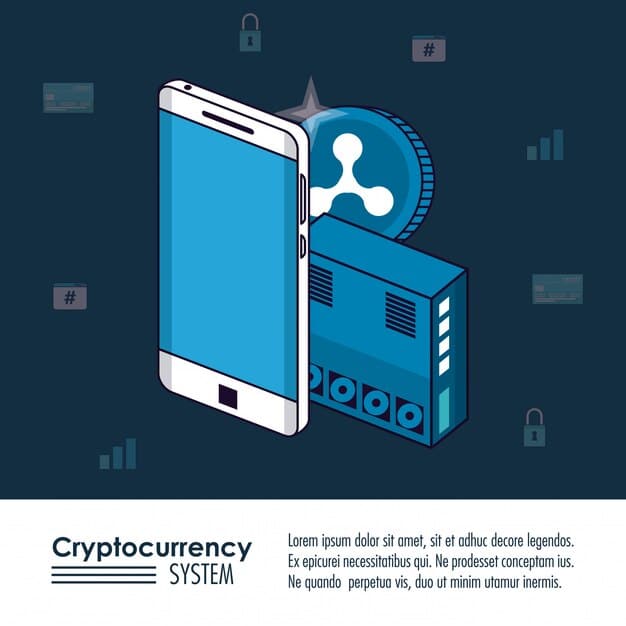DeFi Hacks and Scams: Your Guide to Staying Safe in the US Crypto Space

DeFi hacks and scams are a significant threat in the US crypto space, but understanding common attack vectors, implementing robust security measures, and staying informed can help you protect your assets and navigate the decentralized finance landscape safely.
Navigating the world of Decentralized Finance (DeFi) in the US can be exciting, but it’s crucial to be aware of the risks. DeFi hacks and scams are prevalent, and understanding how to protect yourself is essential for anyone investing in or using DeFi platforms. This guide will help you stay safe in the US crypto space.
Understanding the Landscape of DeFi Hacks and Scams in the US
The decentralized nature of DeFi, while offering many advantages, also makes it a prime target for malicious actors. Understanding common attack vectors and the scale of the problem is the first step in protecting yourself. In the US, with its active crypto community, DeFi hacks and scams are a persistent concern.
Common Types of DeFi Attacks
DeFi attacks can take many forms, each exploiting different vulnerabilities in the system. Common attack types include:
- Flash Loan Attacks: Exploiting vulnerabilities in smart contracts using flash loans to manipulate prices.
- Rug Pulls: Malicious developers abandoning a project after investors have put in money, often selling off their holdings and crashing the value of the token.
- Smart Contract Vulnerabilities: Exploiting flaws in the code of smart contracts.
- Phishing and Social Engineering: Tricking users into giving up their private keys or connecting to malicious websites.
These attacks can result in significant financial losses for users.
Scale of DeFi Hacks and Scams
The financial impact of DeFi hacks and scams is substantial. Millions of dollars are lost each year due to these incidents. Staying vigilant and informed is key to avoiding becoming a victim.

In conclusion, understanding the types and scale of DeFi hacks and scams in the US is critical for anyone looking to participate in the DeFi ecosystem. By staying informed, you can better protect your investments and navigate the space more safely.
Identifying and Avoiding Phishing and Social Engineering Attacks
Phishing and social engineering are some of the most common methods used by scammers in the DeFi space. These attacks rely on manipulating users into revealing their private information or making unwise decisions. Understanding how these attacks work and what red flags to look for can significantly reduce your risk. The US crypto market is particularly susceptible to these tactics, due to its large user base and diverse range of platforms.
Recognizing Phishing Attempts
Phishing attempts often come in the form of emails, messages, or websites that look legitimate but are designed to steal your information. Key indicators of a phishing attempt include:
- Unexpected Communications: Be wary of unsolicited emails or messages asking for your private keys or login information.
- Sense of Urgency: Scammers often create a false sense of urgency to pressure you into acting quickly without thinking.
- Poor Grammar and Spelling: Phishing emails frequently contain grammatical errors or typos.
- Suspicious Links: Always hover over links to check the actual URL before clicking. Ensure the URL is legitimate and secure (starts with “https”).
Always verify the authenticity of any communication before taking action.
Protecting Yourself from Social Engineering
Social engineering involves manipulating people to gain access to sensitive information or systems. Following these tips can help protect you:
- Be Skeptical: Always question requests for information or access, even if they appear to come from trusted sources.
- Use Strong Passwords: Create unique, complex passwords for all your accounts, and use a password manager to store them securely.
- Enable Two-Factor Authentication (2FA): Add an extra layer of security to your accounts by requiring a second verification method, such as a code sent to your phone.
- Never Share Private Keys: Your private keys are like the keys to your bank account. Never share them with anyone.
By practicing vigilance and following these precautions, you can significantly reduce your vulnerability to phishing and social engineering attacks. Remember, the DeFi space in the US is filled with opportunities, but it also demands a cautious approach.
Securing Your Wallets and Private Keys
Protecting your wallets and private keys is fundamental to securing your DeFi assets. Your private keys are essentially the keys to your crypto treasure chest, and if they fall into the wrong hands, your funds could be at risk. The US crypto landscape, with its diverse array of wallets and exchanges, requires a diligent approach to security.
Choosing a Secure Wallet
The type of wallet you choose can significantly impact your security. Consider the following options:
- Hardware Wallets (Cold Storage): These devices store your private keys offline, making them virtually immune to online attacks. Examples include Ledger and Trezor.
- Software Wallets (Hot Wallets): These wallets are convenient for everyday transactions but are more vulnerable to attacks. Options include MetaMask and Trust Wallet.
- Multi-Signature Wallets: These wallets require multiple approvals for transactions, adding an extra layer of security.
Select a wallet that balances security with convenience, based on your individual needs and risk tolerance.
Best Practices for Protecting Private Keys
Once you have a wallet, follow these best practices to protect your private keys:
- Keep Your Keys Offline: Store your private keys offline whenever possible, especially for large amounts of cryptocurrency.
- Use Strong Passwords: Protect your wallet with a strong, unique password.
- Backup Your Keys: Create a secure backup of your private keys in case your device is lost, stolen, or damaged.
- Store Backups Safely: Store your backups in multiple secure locations, away from your computer and phone.
By implementing these security measures you are taking proactive steps to protect yourself. Remember, the security of your funds is ultimately your responsibility.

Understanding Smart Contract Risks and Audits
Smart contracts are the backbone of DeFi applications, but they can also introduce significant risks if not properly audited and secured. Vulnerabilities in smart contract code can be exploited by hackers, leading to substantial financial losses. By being aware of these risks and understanding the importance of audits, you can make more informed decisions about which DeFi platforms to use.
The Importance of Smart Contract Audits
Smart contract audits involve a thorough review of the code by security experts to identify potential vulnerabilities. These audits can help uncover hidden flaws that could be exploited by hackers. Look for the following when assessing a DeFi project:
- Independent Audits: Check if the project has undergone audits by reputable security firms.
- Audit Reports: Review the audit reports to understand the identified vulnerabilities and how they were addressed.
- Ongoing Monitoring: Ensure the project has a plan for ongoing monitoring and security updates.
A project’s commitment to security is a key indicator of its trustworthiness.
Common Smart Contract Vulnerabilities
Some common vulnerabilities that can be exploited in smart contracts include:
- Reentrancy Attacks: Allowing malicious contracts to repeatedly call a vulnerable function before it completes its execution.
- Integer Overflow/Underflow: Causing unexpected behavior by exceeding the maximum or minimum value of an integer.
- Timestamp Dependence: Relying on timestamps, which can be manipulated by miners.
- Denial of Service (DoS): Overloading the contract with requests to make it unusable.
By understanding these vulnerabilities, you can better assess the risks associated with a particular DeFi project.
In summary, being vigilant about smart contract risks and audits is essential for participating safely in the DeFi space. Look for projects that prioritize security and transparency, and always do your own research before investing.
Staying Informed: Following Security Best Practices in the US DeFi Space
The DeFi landscape is constantly evolving, with new exploits and vulnerabilities emerging all the time. Staying informed about the latest security threats and best practices is crucial for protecting your assets. A proactive approach to security, combined with continuous learning, can help you navigate the DeFi space safely. The US DeFi market, given its innovative nature, necessitates ongoing vigilance.
Staying Up-to-Date with Industry News
Follow reputable sources of information and stay current on the latest trends and security threats. Consider the following:
- Security Blogs and Newsletters: Subscribe to security blogs and newsletters from reputable sources.
- Social Media: Follow security experts and thought leaders on social media platforms.
- Community Forums: Participate in community forums to learn from others and share your own experiences.
Staying informed is a continuous process that requires active participation and engagement.
Implementing Security Best Practices
Implement the following best practices to enhance your security:
- Diversify Your Holdings: Don’t put all your eggs in one basket. Diversify your holdings across multiple DeFi platforms and assets.
- Use a VPN: Use a Virtual Private Network (VPN) to encrypt your internet traffic and protect your privacy.
- Regularly Update Software: Keep your software wallets, operating systems, and other software up to date with the latest security patches.
- Review Permissions: Regularly review and revoke permissions granted to DeFi applications to minimize potential risks.
These practices can significantly reduce your risk of falling victim to DeFi hacks and scams.
In conclusion, staying informed and implementing security best practices are essential for navigating the DeFi space safely. Remember, security is an ongoing process that requires constant vigilance and adaptation.
Insurance and Risk Mitigation Strategies for DeFi Users in the US
Even with the best security practices, there’s always a risk of something going wrong in the DeFi space. Smart contract bugs, exchange hacks, and other unforeseen events can lead to significant financial losses. Implementing risk mitigation strategies and considering insurance options can help protect your assets and provide peace of mind. The US DeFi users should take advantage of insurance and risk mitigation strategies.
Exploring DeFi Insurance Options
DeFi insurance is a relatively new but growing area that offers coverage against various risks. Consider the following options:
- Smart Contract Cover: Protects against losses due to vulnerabilities in smart contracts. Nexus Mutual and Cover Protocol offer these options.
- Custodial Cover: Protects against losses due to hacks or theft on centralized exchanges.
- Yield Insurance: Protects against losses due to unexpected drops in yield farming returns.
Carefully evaluate the terms and conditions of any insurance policy before purchasing it.
Developing a Risk Mitigation Plan
Create a plan to help mitigate potential risks:
- Set Stop-Loss Orders: Use stop-loss orders to limit potential losses in volatile markets.
- Use Small Amounts Initially: Start with small amounts when trying out new DeFi platforms and protocols.
- Monitor Your Positions: Regularly monitor your positions and adjust your strategy as needed.
- Have an Exit Strategy: Know when to exit a position and take profits or cut losses.
By combining insurance with a well-thought-out risk mitigation plan, DeFi users can better protect their assets and navigate the space with confidence.
| Key Point | Brief Description |
|---|---|
| 🛡️ Wallet Security | Choose hardware wallets & secure your private keys offline. |
| 🎣 Phishing Awareness | Be skeptical of unsolicited requests & verify communication authenticity. |
| 🔍 Smart Contract Audits | Check for independent audits & review reports before using DeFi platforms. |
| 📰 Stay Informed | Keep up with industry news & security best practices to avoid scams. |
FAQ: Navigating DeFi Security in the US
The common DeFi hacks and scams include rug pulls where developers abandon the project, flash loan attacks exploiting smart contract vulnerabilities, and phishing attempts to steal private keys. Always be wary of these threats.
Store your private keys offline using hardware wallets whenever possible. Never share your private keys with anyone, and always use strong, unique passwords for your accounts.
Ensure the project has undergone audits by reputable security firms. Review the audit reports to understand the identified vulnerabilities and how they were addressed. Look for ongoing monitoring and security updates.
DeFi insurance can be worth considering, especially if you’re investing a significant amount. It provides coverage against smart contract vulnerabilities, hacks, and other unforeseen events. Evaluate the terms and conditions carefully.
Subscribe to security blogs and newsletters, follow security experts on social media, and participate in community forums. Staying up-to-date with industry news is essential for identifying and avoiding potential scams.
Conclusion
In conclusion, navigating the DeFi space in the US requires a proactive and informed approach to security. By understanding common threats, implementing robust security measures, staying informed, and considering risk mitigation strategies, you can protect your assets and participate in the decentralized finance revolution with greater confidence.





